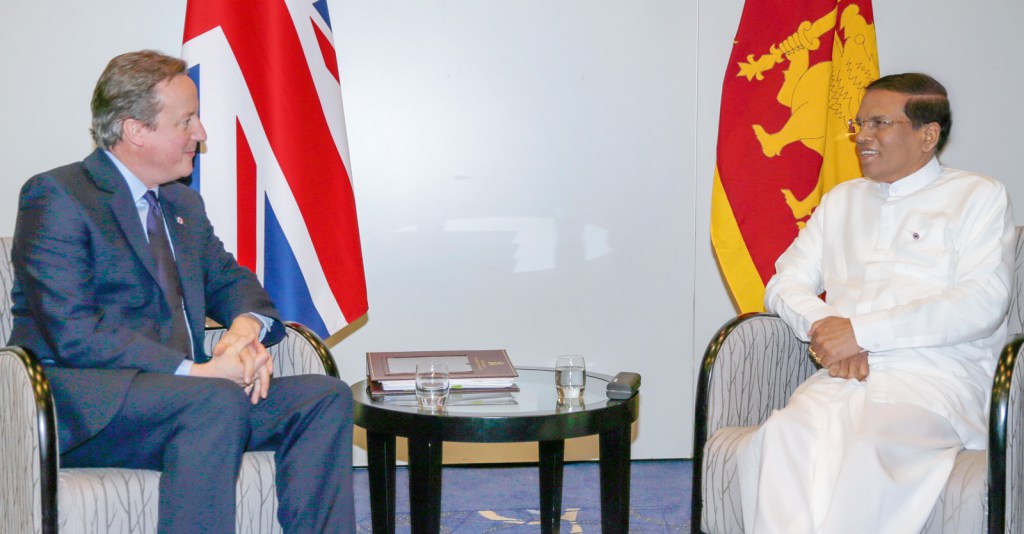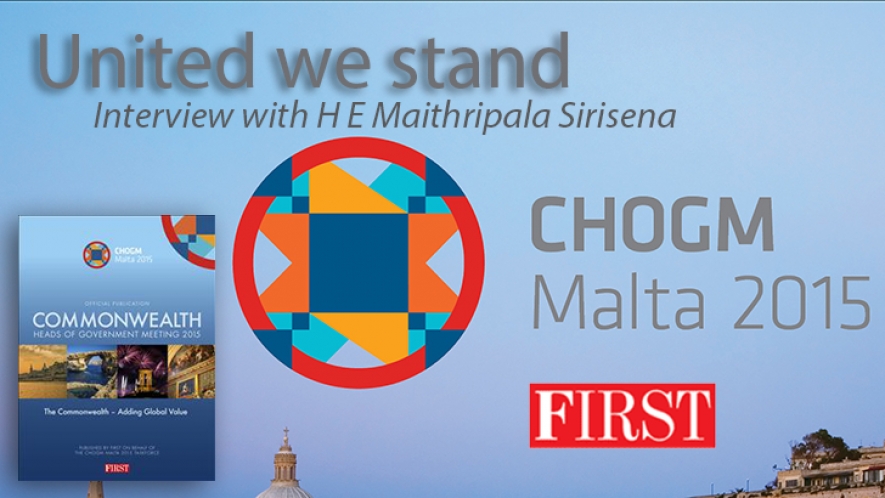
Question: How important is the Commonwealth to Sri Lanka? What have been your main highlights as Chair-in-Office?
Answer: As a founder member of the Commonwealth of Nations and the oldest democracy in Asia, Sri Lanka cherishes the organization and adheres to its principles. One important factor is that the Commonwealth brings together such a large number of democracies that has now exceeded its post-colonial beginnings.
Sri Lanka remains firmly committed to upholding the principles of the Commonwealth and seeing to the widening of its scope and relevance in contributing to international cooperation, and the building of a world order that supports sustainable development and the fair distribution of economic resources and capabilities of nations.
The core beliefs that form the CHOGM’s charter, are not necessarily newly invented: namely, democracy, human rights, international peace and security, tolerance, respect and understanding, freedom of expression, separation of powers, rule of law, good governance, sustainable development, protecting the environment, access to health, education, food and shelter, gender equality, importance of young people in the Commonwealth, recognition of the needs of the small states, recognition of the needs of the vulnerable states, and lastly, the role of civil society. These cover a baseline formula of any national strategy and states are bound by these to deliver as per their mandate. These are among the aspects that I think makes the Commonwealth both a relevant and valuable part of the international community today.
As Chair in Office, we managed to showcase the progress Sri Lanka has made in recent past. We could show the world how we have strengthened the democratic institutions and progressed on the path of reconciliation and how the people are living in harmony, the economic progress we’re making, and what approaches we are taking to address the post-war challenges.

Question: What are your diplomatic priorities (regional and global)?
Answer: Sri Lanka maintains a middle-path or non-aligned foreign policy. It is ‘Asia-centric Middle Path’. The aim of our government is to build widest friendships internationally that recognizes and respects our individuality as a nation. It remains our policy to strictly adhere to the middle path and extend friendship to all nations, strengthen trust and cooperation with international organizations, multi-national bodies and regional institutions, to achieve greater mutual understanding. While pursuing a policy of the Middle Path, we will focus more on fostering ties with our closest neighburs in South Asia.
It is the expectation of our Government to obtain the assistance of friendly nations and international organizations to advance the development of our country and assure the future success of our people. We are also committed to the expansion in intra-regional economic integration.
 Question: What key policies distinguish your administration from the previous one?
Question: What key policies distinguish your administration from the previous one?
Answer: That question can be easily answered if you take a look at how diverse my Cabinet is. We have a government comprising of the two main political parties in the country, the Sri Lanka Freedom Party (SLFP) and the United National Party (UNP), the two rival political parties that ruled the country separately for more or less three decades each since independence in 1948. Furthermore, in our government we have members from various minor political parties too with different political philosophies and different ethnicities and religions. While respecting the differences among us, we have succeeded in working together to find solutions to the country’s problems. In other words, we have succeeded in introducing a new culture of consensual politics in Sri Lanka.
My Government introduced essential amendments to the Constitution in order to strengthen democracy in Sri Lanka. These amendments have reinforced the foundations of good governance through institutional reforms that strengthened pluralism and democracy. With my personal intervention and facilitation, some of the executive powers vested in the Presidency were transferred to the Parliament and other independent institutions.
Question: How can you reassure the international community that Sri Lanka is now politically stable?
Answer: The people of Sri Lanka gave me a mandate at the Presidential election held in January 2015 to take Sri Lanka on the path to progress as an awakened nation that values good governance, democracy, the Rule of Law, and equal opportunities for all. We have taken clear and resolute steps to further strengthen democracy and good governance, the Rule of Law, and a truly meaningful parliamentary system; to establish a long lasting and stable structure of good governance in keeping with the mandate given by the people. My Government introduced essential amendments to the Constitution in order to strengthen democracy in Sri Lanka. These amendments have reinforced the foundations of good governance through institutional reforms that strengthened pluralism and democracy. With my personal intervention and facilitation, some of the executive powers vested in the Presidency were transferred to the Parliament and other independent institutions. We work progressively to draft a new constitution with the consent of all the political parties and people.
The fact that quite a few leaders of most powerful and influential countries in the world visited Sri Lanka is a proof of international recognition of the stability in Sri Lanka.
Question: How would you define the ‘Sri Lankan’ identity? How is it distinct from other countries in the region?
Answer: Sri Lanka is in the forefront among the oldest representative democracies in the South Asian region. We have been fortunate in preserving the democratic ethos in our country despite the prolonged conflict. Despite several factors militating against maintaining a high economic growth rate, we succeeded in sustaining the state social welfare policies that were carried over since attaining independence. We never compromised on these policies which includes universal free education, free healthcare and eradication of poverty. Following a path of social democracy, Sri Lanka has succeeded in achieving high levels in the Human Development Index, even during the years of conflict. This success is testimony to our commitment for achieving the Millennium Development Goals of the United Nations.
Our new vision for the country involves achieving the twin objectives of sustainable development and reconciliation. A fundamental requirement in this context is dealing with the past honestly and building a modern Sri Lankan Nation.
Question: How do you ensure effective protection of minorities in a greatly diverse society?
Answer: One of the strengths of Sri Lanka is its rich diversity. We give the highest priority to improving relations between communities, the followers of different faiths, and those who speak different languages. We have taken steps to remove misunderstandings, foster public trust and overcome post –conflict challenges, and more will need to be done. In Sri Lanka, different communities and religions have existed in harmony for centuries. If you just look at Colombo, you find Buddhist temples, Hindu kovils, Christian churches and Muslim mosques close to each other and people freely observing their faith. The government treats all communities and religions equally.
In dealing with the past, we will follow a process of truth seeking, justice, reparation and non-recurrence. We have initiated an All Party Conference to look into the issues and to suggest measures for long term reconciliation and communal harmony. It is the task of the government to find a just, equitable and reconciliatory solution, that is acceptable and familiar to the people of Sri Lanka.
Question: What is your economic growth strategy and what are your sectoral priorities?
Answer: Growth with equity is our economic strategy. Inclusive growth is a challenge not only for Sri Lanka, but the whole world. First and foremost, I stress on the fact that, in the inter-connected world we live in today, no country alone can think of promoting inclusive growth, unless the whole world come together for the purpose. 2030 sustainable development goals will guide Sri Lanka, as we take them seriously and committed to achieve them. Sri Lanka’s policy framework is in the process of being revitalized to be able to reflect the inspiration from sustainable development targets for 2030.
We believe that our efforts will help narrow the gap in wealth, now existing among different sections of our society and contribute towards the creation of a more equitable society. Concern for people and earth is at the core of Sri Lanka’s development trajectory. My understanding of sustainable development is not to have sectorally or group-wise isolated development, but to have an inclusive model of development that is capable of uplifting development standards globally. For this purpose, I stress on the need for a fresh universal approach.
Question: What key investment opportunities would you like to promote to international businesspeople?
Answer: Sri Lanka believes in a market economy while ensuring social justice. The country is open for foreign investment and business but on conditions favorable to the country. Sri Lanka is ranked as having the most liberalized economy in South Asia, shown by the high level of deregulation, greater encouragement to the private sector, and opening the economy to international competition. An independent judiciary with investment laws aimed to foster foreign direct investment; a skilled and highly trainable workforce and the rapid expansion of Information Technology also contribute to the rising investment potential in the country.
The Board of Investment (BOI) Sri Lanka provides all required assistance to local and foreign investors to start profitable ventures.
Question: What is your future vision for Sri Lanka as a society and as an important player in world economy?
Answer: My vision is a peaceful and prosperous Sri Lanka. I want Sri Lanka to remain a strong viable democracy where all its people live together in harmony, and I want all Sri Lankans to have equal opportunity to achieve prosperity. My government plans to absorb new technological tools, utilize modern technology and encourage innovative thinking in sectors such as education, health and industrialization, for sustainable and inclusive progress. We have been fortunate in preserving the democratic ethos in our country despite many challenges to the system of governing. Despite several factors militating against maintaining a high economic growth rate, we succeeded in sustaining the state social welfare policies that were carried over from Independence. We never compromised on these policies which includes universal free education, free healthcare and eradication of poverty. My aim is to build a modern Sri Lankan Nation.




















